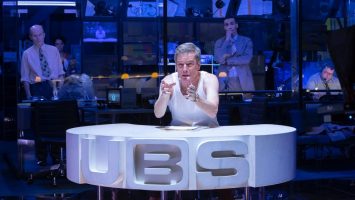
In 1976, when serious white men named Cronkite, Chancellor, and Reasoner told you everything important in the world in 22 minutes on their evening newscasts, writer Paddy Chayefsky and director Sidney Lumet introduced us to Howard Beale, a network anchorman overwhelmed by life to the point of a breakdown — on national television. Peter Finch won a posthumous Oscar for the role.
Now, writer Lee Hall has adapted Chayefsky’s script for the stage and director Ivo van Hove has ramped up the energy, but the story still centers on Beale. The role is likely to win Bryan Cranston another Tony award.
Cranston did the show in London for six months (winning an Olivier award), and will only be in the Broadway production for five. If you ever needed proof of what a powerful performer he is, all you need to witness is his performance just before the famous “I’m mad as hell and I’m not gonna take it any more!” speech. In two wordless minutes, Cranston’s Howard Beale devolves into a faceful of tears, confusion, and disillusionment. It’s quite something to see, both in person and via the video feed that dominates the stage. It even causes some of the other actors to have tears dripping down their cheeks — I watched, and there was nothing applied. These performers were truly crying on cue. Although I’ve seen him in both mediums, I was stunned by Cranston’s ability to play big for the theater audience and small for the TV cameras simultaneously — a combination few actors could pull off.
That video feed I referred to continues almost non-stop throughout the show, projected on the back and side walls to not only show what’s happening in each Beale broadcast, but also a litany of TV commercials and news items from the mid-1970s. It’s part of the visual assault with which director Hove keeps your attention — because there’s no intermission, it’s a two-hour onslaught of information and words and images that never lets you catch your breath. For an always-on, screen-dominated society, his direction and pacing are as timely today as Lumet’s were in the movie’s era.
My one objection to the staging is that several of the scenes are played upstage left, out of view from my side of the audience, blocked by the glass-walled control room on the set. An on-stage camera crew with Steadicams allows access to all the conversations via the big screen, but it would have been nice not to have to watch so much of the show in that 2-D form when the actors were right there.
The supporting cast includes Tony Goldwyn as Max Schumacher, the part played in the movie by William Holden. My wife commented that he’s too young for the role, but I looked it up and was surprised to discover that Goldwyn is 58 — the same age Holden was in 1976. The difference is that the latter had a craggy, world-weary look that Goldwyn doesn’t. That’s not a criticism, just an observation that he makes the character seem younger than he is.
Tatiana Maslany is making her Broadway debut as Diana Christensen, the ruthless network programming chief originally played by Faye Dunaway. She has a different appeal, although I wish she’d played up the character’s ruthlessness more (Laura Linney would have been perfect). Also, the romance between Diana and Max doesn’t work as well because Maslany and Goldwyn don’t have the sizzling chemistry of Dunaway and Holden.
Nick Wyman has the big Edward Jensen speech (“You have meddled with the primal forces of nature, Mr. Beale, and I won’t have it!!”) but with a lot less bluster than Ned Beatty used. The words are just as powerful, yet they don’t have the same impact when toned down. Unfortunately, this stage version downplays a key subplot about the Ecumenical Liberation Party, the domestic terrorist group Diana got so cozy with in the movie, which helped set up more clearly what happens to Beale in the end.
All of those criticisms are proof that “Network” is a tough story to adapt to the stage. However, the video wizardry and especially Cranston’s performance make this version worthwhile. Even the subtle stuff he does works — like Beale at the desk, seconds before airtime, always checking to see if his shirt cuffs are longer than his suit coat’s sleeves. Or how his top lip is literally stiffer when he’s in broadcast anchorman mode early in the play, but looser and more ready to sneer during his later on-air rants.
Chayefsky’s storyline was prescient about the changes to come in TV journalism, and to some who haven’t seen the movie, it will seem like a commentary on modern TV news. For instance, Beale rants about television giving us the information we want to hear, not what we need — a concept never truer than today. When he inveighs against all the things we should be mad about, he pauses before adding “…and the Russians!” The theater audience gasps and applauds, and probably thinks the line was added for our Trumpian times, but it was in Chayefsky’s script for the movie, when we were still in the midst of a Cold War with the Soviet Union.
In the hands of a lesser actor, “Network” might seem like yet another movie-to-stage gimmicked attempt at a cash grab. But in Bryan Cranston’s hands, it becomes something greater, the saga of a man-on-the-edge from a bygone era whose story still rings true in our time.
